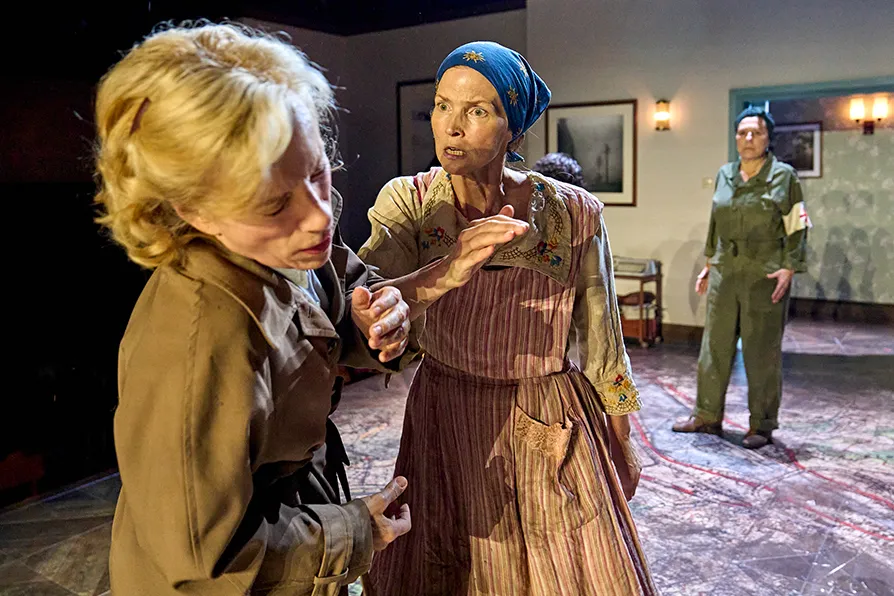RON JACOBS welcomes a timely history of the Anti Imperialist league of America, and the role that culture played in their politics
MARY CONWAY is frustrated by a new play that loses its drama amid the moral dilemma of re-settling children in the aftermath of WWII

 COMEUPPANCE: Juliet Stevenson (Ruth), Cosima Shaw (Thomas' Mother), and Caroline Loncq [Pic: Manuel Harlan]
COMEUPPANCE: Juliet Stevenson (Ruth), Cosima Shaw (Thomas' Mother), and Caroline Loncq [Pic: Manuel Harlan]
The Land of the Living
NT Dorfman
★★★
THE importance of a new stage play from David Lan has not been lost on the National Theatre. And when its theme is a little-discussed consequence of World War II — and a particular feature relating to eastern Europe — its contemporary relevance is paramount.
Based on the research and writings of the incomparable Gitta Sereny, Lan, together with esteemed director Stephn Daldry, transports us to allied-occupied Germany where a major post-war operation to resettle millions of displaced people (DPs) is under way: in particular, the rehabilitation of children.
Ruth, performed with effortless, commanding presence by Juliet Stephenson, is a UN relief worker, combining with the US military to rescue thousands of children and, where possible, return them to their homes. Ruth is passionately convinced of her moral rectitude in this. But there are complications, for the children are being snapped up in Germany, often by bereft families, simply as slave labour, or — much more disturbingly — by those steeped in Nazi philosophy who compete to adopt Slavic children with Aryan attributes who fit their genetic aspirations.
Ruth, believing it her life’s work to save these children, arranges to capture one such “special” child, Thomas, and wrest him from his Bavarian adoptive parents.
The play opens in 1990 with Ruth facing the now grown-up Thomas who, fresh from the US, can barely conceal a lifelong anger, much of it aimed at her. The narrative of Thomas’s story, as explained to him by Ruth, becomes the substance of the play. And extensive flashbacks reek of authenticity.
But Ruth’s journey is a complex one, taking her from her early crusading zeal to a whole reassessment of what was best for the individual child. Thomas, meanwhile, is heartbreakingly bitter that Ruth traumatically snatched him from his second family, yet failed to return him to the land of his birth, leaving him culturally and emotionally adrift.
Compassion for the child is the moving, emotional path through this play. And this is made doubly so by the superb performance of Artie Wilkinson Hunt as the young Thomas who plays from the soul with a kind of maturity rarely seen in children. As his grown-up version, Tom Wlaschiha seethes with rage, letting rip only when he expertly plays the piano which seems the only outlet for his confusion and loss.
Production values are top-notch: Miriam Buether’s gleaming traverse stage that seems to extend for miles, Paul Englishby’s haunting score that captures the bell-like voices of the countless children which we also hear; and a whole squad of actors whose languages and accents evoke the kind of cultural diversity so hopelessly impossible for little ones far from home.
The play takes us unequivocally — if sometimes stereotypically — into period and place, but gets bogged down in its flashbacks. Crucially, too, the central character of Ruth never loses her sense of cultural superiority, nor ever develops from her basic narrator role.
As a result, the play becomes dense and heavy with facts, prioritising complex moral issues over real dramatic flow. A pity.
Runs until November 1. Box office: (020) 3989-5455, nationaltheatre.org.uk.










